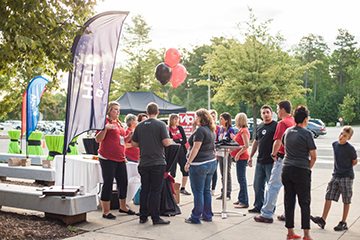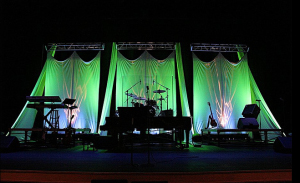
 Does the theology of “storytelling” with a church’s facility apply to multisite campuses and church plants, especially if it’s not your “place”? Does it matter that we don’t create a sense of place? Is it worth the mental, emotional, physical and financial investment to communicate your unique story?
Does the theology of “storytelling” with a church’s facility apply to multisite campuses and church plants, especially if it’s not your “place”? Does it matter that we don’t create a sense of place? Is it worth the mental, emotional, physical and financial investment to communicate your unique story?
Answer: Yes.
Why does it matter? Because people matter, and your multisite or church plant is there to reach your community and people.
I believe it’s obvious, that if you have an owned facility or a long-term lease, the options that avail themselves to you for communicating your story are vast. You can impact the exterior elevation (in most cases) and the interior environments. You can theme the rooms, change colors, add lighting and all the elements to communicate your story that these kinds of facilities present.
But, what if you’re in a school, community center, performing arts center, YMCA or any other facility that you rent and only have access to one day a week — and only for a few hours? Are you stuck with what they give you? Do you have to settle with the decor, features and storytelling of that facility? Are you relegated to compromising on every aspect of the environment and sense of place?
Answer: No.
Let’s think about all of the different ways that you can impact the first impression of your guest as you tell your story. These are going to look very familiar to the components we have been exploring for owned facilities:
1) Website. As we have discussed, your website is the new Front Porch. Work it. Make it relevant and contextual to your target market.
2) Street- Scape. Just because you can’t change the facade of the high school you’re renting, doesn’t mean that you should neglect the sense of arrival. If you owned the facility you could greatly impact the seven-days-a-week view for passers-by. But just because you only have the facility one day of the week, that doesn’t mean you should just settle for what the existing built environment communicates.
Scape. Just because you can’t change the facade of the high school you’re renting, doesn’t mean that you should neglect the sense of arrival. If you owned the facility you could greatly impact the seven-days-a-week view for passers-by. But just because you only have the facility one day of the week, that doesn’t mean you should just settle for what the existing built environment communicates.
Add banners. Install temporary signs. Add bright colors that catch people’s attention. Use digital effects. Line the street with people in matching T-shirts. Make a visual statement. Don’t squander this opportunity to catch the attention of the community and suck them in. They may not pull in the parking lot the first time they drive by — but, if you’re consistent and relevant to them, they’re more likely to become your guest.
3) Parking ministry. Do parking right: It doesn’t matter if you own the parking lot or are just renting, you can impact guests by how their first impression, once on the parking lot, is handled. The interaction, prayer and safety elements can make or break the experience of every guest. Remember, you only have seven seconds to make that first impression.
4) Which way do I go? Make it obvious. Use all the senses to lead your guests to the entrances you want them to use. There should be visual clues at a minimum, but why not use auditory and interpersonal clues?
5) Write your scripts. Develop and use scripts that depict the experience you want every guest to realize. This is a great way to set expectations for your volunteers/ambassadors and to train them as you continue to grow and expand your teams.
6) Offer an environmental experience. This is where intentionality and creativity may be required the most. How do we make a school entrance feel like a warm, cool and inviting lobby where people want to hang out and share life together? How do we make the kids’ spaces feel fun and secure? How do we downplay the institutional feel of the typical school facility?
As you d evelop your plan, think about the mediums that communicate your culture and vision, and then figure out how to make them portable. Maybe it’s TV monitors that are mounted to truss material that can be stored in a travel case and pulled out on Sunday? It may be banners, a portable espresso machine, comfy couches, area rugs, banners, static applied graphics, etc., etc., etc. It may also mean being a “partner” with your landlord and offering to invest in their facility to improve the environment — like re-carpeting, painting, adding a killer sound system that they benefit from and so many other ways.
evelop your plan, think about the mediums that communicate your culture and vision, and then figure out how to make them portable. Maybe it’s TV monitors that are mounted to truss material that can be stored in a travel case and pulled out on Sunday? It may be banners, a portable espresso machine, comfy couches, area rugs, banners, static applied graphics, etc., etc., etc. It may also mean being a “partner” with your landlord and offering to invest in their facility to improve the environment — like re-carpeting, painting, adding a killer sound system that they benefit from and so many other ways.
I’m not trying to give you an exhaustive list, but rather trying to stretch your thinking. Don’t just think outside the box; ask, “WHAT BOX?”
7) Personal interactions. Nothing overcomes a less-than-perfect built environment like engaging personal interactions. There are many obvious human touch points that will impact your guests. We talked about some when we discussed the parking lot ministry and how incredibly important it is with establishing that first impression.
The greeters are the next obvious touch point. Are they warm, welcoming, engaging, not too overbearing, informative, etc.? Are they there only to hand out the “bulletin” or worship guide, or are they there to impact people? Don’t forget to write a script for this area of your ministry, just like we did for the first time guest with kids or the parking lot team. Determine what defines a WIN for that group of ambassadors of your story. They’re not just greeters or the only people you could find to do that “job”; they’re the initial face of your story. They’re ambassadors and ministers in their own right.
Don’t succumb to the trap of mediocrity just because you rent a school or other facility. Expend the same intentionality (if not more) that you would if you owned a facility or were getting ready to build from the ground up.
Don’t settle. Your guest are counting on you.
 Tim Cool is project executive at Visioneering Studios in Charlotte, NC, and founder of Cool Solutions Group. Since 1986, Cool has served the church community in the areas of construction, facility planning and facility management. He can be reached at tcool@visioneeringstudios.com. This blog originally appeared on his blog, “Cool Conversations Live.”
Tim Cool is project executive at Visioneering Studios in Charlotte, NC, and founder of Cool Solutions Group. Since 1986, Cool has served the church community in the areas of construction, facility planning and facility management. He can be reached at tcool@visioneeringstudios.com. This blog originally appeared on his blog, “Cool Conversations Live.”


